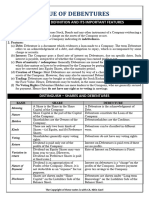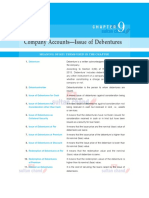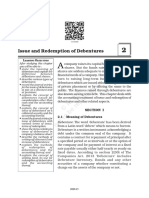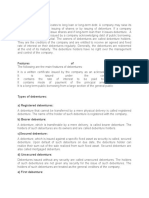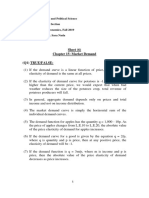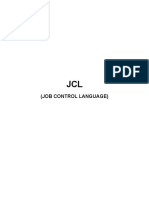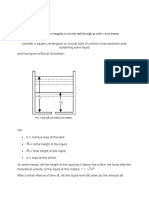Nagpal Institute of Training & Coaching (Computer & Commerce Inst.
)
H.O:- # 658, Sector 11 Panchkula (Hry),
Coaching for +1, +2, CA Foundation, BBA, BCom, Mcom and MBA
Online Coaching available for Commerce and Computers
Issue of Debentures
Debenture: It is a document issued by a company under its common seal acknowledging the debt
and it also contains the terms of repayment of debt and payment of interest at a specified rate.
Section 2 (30) of Companies Act, 2013 defines debenture as “Debenture includes debenture stock,
bonds or any other instrument of a company evidencing a debt, whether constituting a charge on
the company’s assets or not.”
Debentures are generally freely transferable by the debenture holder. Debenture holders have no
rights to vote in the company’s general meetings of shareholders. The interest paid to them is a
charge against profit in the company’s financial statements.
TYPES OF DEBENTURES
1. Convertibility point of view : There are two types of debentures :
Convertible debentures, which can be converted into equity shares of the issuing company after a
predetermined period of time.
These may be Partly Convertible Debentures (PCD) : A part of these instruments are
converted into Equity shares in the future at notice of the issuer. The issuer decides the ratio for
conversion. This is normally decided at the time of subscription.
Fully convertible Debentures (FCD) : These are fully convertible into Equity shares at the
issuer’s notice. The ratio of conversion is decided by the issuer. Upon conversion the investors
enjoy the same status as ordinary shareholders of the company.
Non-convertible Debentures, which are simply regular debentures, cannot be converted into equity
shares. These are debentures without the convertibility feature, these usually carry higher interest
rates than their convertible counterparts.
2. Security point of view, debentures are classified into:
Secured Debentures: These instruments are secured by a charge on the fixed assets of the
issuer company. So, if issuer fails to pay of either the principal or interest amount, its assets can
be sold to repay the liability towards debenture holders.
Unsecured Debentures: These instruments are unsecured in the sense that if the issuer defaults
on payment of the interest or principal amount, the investor is treated like other unsecured
creditors of the company.
3. From Redemption point of view
Redeemable Debentures : Redeemable debentures are those which are redeemed or paid off
after the termination of fixed term. The amount paid off includes the principal amount and the
current year’s interest.
Irredeemable or Perpetual Debentures : Irredeemable debentures are those debentures which
do not have any fixed date of redemption. They are redeemed either in the event of winding up
or at a very remote period of time. Irredeemable or perpetual debenture holders can never force
the company to redeem their debentures.
Distinguish Between a Share and Debenture
Basis Share Debentures
Ownership They are owners of the Company Ther are lenders of the Company
Form of return Dividend Interest
Security Not Secured Secured by a charge on Assets
Voting Right Having Voting Rights No Voting rights
Risk from investor More risky as compare to debt Less Risky as compare to shares
Nagpal Institute of training & Coaching (Computer & Commerce Institute) at Sec 11 Pkl Ph 7889077566,7986276126
Website:- www.nitcpkl.com Teacher – Ashish Nagpal youtube Channel :- NITC Commerce Classes by Ashish Nagpal
� Nagpal Institute of Training & Coaching (Computer & Commerce Inst.)
H.O:- # 658, Sector 11 Panchkula (Hry),
Coaching for +1, +2, CA Foundation, BBA, BCom, Mcom and MBA
Online Coaching available for Commerce and Computers
Issue of Debentures:
Debentures can be issued in following ways:
1. for cash 2. for consideration other than cash 3. As collateral security
Terms of Issue
Debentures can be issued in following ways:
1. Issue of Debentures at Par
2. Issue of Debenture at Premium
3. Issue of Debentures at Discount.
Debenture Payable in Instalments
1. First instalment paid along with application is called as application money.
2. Second instalment paid on allotment is called as allotment money.
3. Subsequent instalments paid are called as call money calls can be more than one and called
First call, second call or as the case may be.
Issue of Debentures for Cash
(a) When Debentures amount received in lump sum with the application
On receipt of Bank A/c Dr. With the application money
application money To Debenture Application received
and Allotment A/c
On acceptance of Debenture App and Allot A/c Dr. With Amount of application
application money To …% Debentures A/c money on allotted debentures,
To Bank A/c and Excess amount refunded.
(B) When Debentures amount received in instalments.
In this case accounting entries will be same as at the time of issue of shares in instalments with
small change in the name of term like-the share capital word replaced with the …% Debentures A/c,
and Share word replaced with Debentures e.g. Equity share capital into 8% Debentures, Equity
share application into Debentures Application and follows on.
AT Par : means debentures are issued at face value.
Issue of Debentures for Consideration other than Cash
When Debentures are issued for purchased of asset
Date Particulars L.F Debit (Rs.) Credit (Rs.)
On Purchases of asset:
Sundry Assets a/c…………Dr
To Vendor a/c …………..
Vender a/c …………………Dr
To % Debentures a/c
On Purchases of business:
Case :- 1:-When purchases consideration is more then net asset
Sundry Asset Account Dr. Agreed
Goodwill Account (B/F) Dr Difference (Cr-Dr)
To Sundry Liabilities Agreed Value
To Vendor Purchase Consideration
Case 2:- When purchase consideration is less than net asset
Sundry Assets Account (Agreed (Agreed Value)
To Sundry Liabilities Value) Purchases Consideration
To Vendor Difference (Dr-CR)
Nagpal Institute of training & Coaching (Computer & Commerce Institute) at Sec 11 Pkl Ph 7889077566,7986276126
Website:- www.nitcpkl.com Teacher – Ashish Nagpal youtube Channel :- NITC Commerce Classes by Ashish Nagpal
� Nagpal Institute of Training & Coaching (Computer & Commerce Inst.)
H.O:- # 658, Sector 11 Panchkula (Hry),
Coaching for +1, +2, CA Foundation, BBA, BCom, Mcom and MBA
Online Coaching available for Commerce and Computers
To capital Reserve A/c (B/F)
(a) On Issue of Shares at Par
Vendor Dr.
To …% Deb a/c
(b) On Issue of Share At Premium
Vendor Dr. (Calculating number of Shares:-
To ….% Deb A/c Purchase Consideration/Face value+
To Securities Prem. Res. A/c Premium
(c) On Issue of Share At Discount
Vendor Dr. (Calculating number of Shares:-
Dis on Issue of deb a/c ..Dr Purchase Consideration/Face value-
To ….% Deb A/c Discount
Various Cases of Issue of Debentures from the view point of Redemption:-
Case Conditions of Conditions of Entry Passed
issue redemption
1. Issue at Par Redeemable at par Same
2. Issue at Discount Redeemable at par Same
3. Issue at Premium Redeemable at par Same
4. Issue at Par Redeemable at Prem a) Bank a/c…….. Dr
To Deb App a/c
b) Deb App a/c ….. Dr
Loss on Issue of Deb a/c Dr
To …% Deb a/c
To Prem on Red of Deb a/c
5. Issue at Discount Redeemable at Prem a) Bank a/c…….. Dr
To Deb App a/c
b) Deb App a/c ….. Dr
Dis on Issue of Deb a/c… Dr
Loss on Issue of Deb a/c Dr
To …% Deb a/c
To Prem on Red of Deb a/c
6. Issue at Premium Redeemable at Prem c) Bank a/c…….. Dr
To Deb App a/c
d) Deb App a/c ….. Dr
Loss on Issue of Deb a/c Dr
To …% Deb a/c
To Security Prem Res
To Prem on Red of Deb a/c
Collateral Security : Collateral security means security provided to lender in addition to the principal
security. It is a subsidiary or secondary security. Whenever a company takes loan from bank or from
any financial institution it may issue its debentures as secondary security which is in addition to the
principal security. Such an issue of debentures is known as ‘issue of debentures as collateral
security’. The lender will have a right over such debentures only when company fails to pay the loan
amount and the principal security is exhausted. In case the need to exercise the right does not arise
Nagpal Institute of training & Coaching (Computer & Commerce Institute) at Sec 11 Pkl Ph 7889077566,7986276126
Website:- www.nitcpkl.com Teacher – Ashish Nagpal youtube Channel :- NITC Commerce Classes by Ashish Nagpal
� Nagpal Institute of Training & Coaching (Computer & Commerce Inst.)
H.O:- # 658, Sector 11 Panchkula (Hry),
Coaching for +1, +2, CA Foundation, BBA, BCom, Mcom and MBA
Online Coaching available for Commerce and Computers
debentures will be returned back to the company. No interest is paid on the debentures issued as
collateral security because company pays interest on loan.
In the accounting books of the company issue of debentures as collateral security can be credited
in two ways :
i. First method : No Journal entry to be made in the books of accounts of the company for
debentures issued as collateral security. A note of this fact is given in this case.
ii. Second method : Entry to be made in the books of accounts of the company.
A journal entry is made on the issue of debentures as a collateral security, Debentures Suspense
Account is debited because no cash is received for such issue.
Following journal entry will be made
Journal Debit Credit
Date Particulars LF. (Rs.) (Rs.)
Debenture Suspense A/c Dr.
To % Debentures A/c
(Being the issue of Debentures of Rs.... each issued as
collateral security)
INTEREST ON DEBENTURES
Interest on Debentures is calculated at a fixed rate on its face value and is usually payable half
yearly & is paid even company is suffering from loss because it is charge on profit.
Income Tax is deducted from interest before payment to debenture holders. It is called T.D.S. (Tax
deducted at source).
JOURNAL ENTRIES
When interest is Due
Debentures Interest A/c Dr. (Gross Interest)
To Debentures holder A/c (Net Interest)
To TDS Payable A/c (TDS Deducted)
When Interest is paid
Debentures Holder A/c Dr. (With Interest)
To Bank A/c
On payment of TDS to Government
TDS Payable A/c Dr. (Amount of Income)
To Bank
Interest on debentures is an expense and charged against statement of Profit and Loss a/c.
It should be adjusted against Statement of Profit and Loss a/c only not from any other
reserve.
Where as Discount on issue and Loss on Issue of debentures are to be adjusted from Security
premium and then Statement of profit and Loss account.
Nagpal Institute of training & Coaching (Computer & Commerce Institute) at Sec 11 Pkl Ph 7889077566,7986276126
Website:- www.nitcpkl.com Teacher – Ashish Nagpal youtube Channel :- NITC Commerce Classes by Ashish Nagpal








